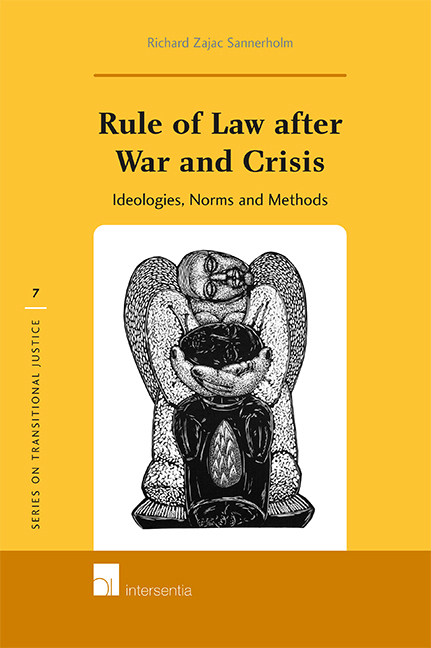Summary
RULE OF LAW AFTER WAR AND CRISIS
This book concerns the norms, ideologies and methods of rule of law reform in war-torn and crisis societies. The main objective is to describe and analyse the effects of international rule of law assistance on legal, judicial and administrative systems. Rule of law reform is the vehicle through which international law and national domestic laws, practices, and institutions variously intersect, collide, interact and harmonise. International interventions play an important part in diff using norms and institutions and bring to the fore a new object of study namely transitional legal orders in war-torn and crisis societies.
Rule of law has emerged as a constituent part of international crisis management. From Haiti to Egypt, from Afghanistan to Liberia, international actors now speak of the fundamental need to strengthen the rule of law for the realisation of a successful transition from war to peace. In order to achieve the twin objectives of a legal system and a political culture embedded in rule of law principles, international actors often assume a direct political and administrative state-building responsibility. Failure to establish the rule of law in a war-torn or crisis society may constitute a serious threat to both national and international security. Sustained instability contributes to organised crime, corruption, trafficking, environmental degradation and weapons proliferation. De facto ‘statelessness’ and proliferating poverty between them aff ord safe havens for the propagation of criminal and terrorist networks.
It should be made clear from the start that no assistance provider would expect that laws and legal institutions subscribing to rule of law principles would be capable of solving such problems alone. However, the faith placed in the rule of law, a concept that Aristotle spoke of as “a government of laws, not men”, and which Cicero realised bound humans “so that we might be free”, is a notion that is sometimes astoundingly devoid of realism. The concept of the rule of law (as presented and applied by international organisations and national donors) renders unto itself an excessively large claim.
Today it is possible to refer to a ‘rule of law consensus’ among international actors in relation to war-torn and crisis societies.
- Type
- Chapter
- Information
- Rule of Law after War and CrisisIdeologies, Norms and Methods, pp. 1 - 8Publisher: IntersentiaPrint publication year: 2012

